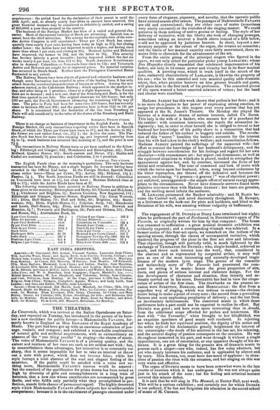THE THEATRES.
La Cenerentola, which was revived at the Italian Operahonse on Satur- day, and repeated on Tuesday, has introduced in the person of its hero- ine a new candidate for public favour—a Mademoiselle FAVANTI, for- merly known in England as Miss EDWARDS of the Royal Academy of Music. The part had been got up with an enormous ostentation of pas- sage. roulade, and compass ; and exhibited a remarkable combination of natural gifts and artificial acquirements, with as extraordinary an absence of the " one thing needful " in singing—the charm of music. The voice of Mademoiselle FAVANTI is of a pleasing quality, and the extent and neatness of her runs are such as are seldom met with : but, to counterbalance these advantages, her intonation is so constantly too sharp, that it seems impossible for her to take an interval or throw out a note with power, which does not become false; while her style betrays a total absence of the soul and elegant feeling of the musician. If the public could be satisfied with a voice and no- thing more, Mademoiselle EAVANTI'S success would be assured : but the standard of the qualification for prima donna has been raised so high by diversity of gifts and accomplishments in a long train of heroines, that a new one whose excellencies are accompanied by great faults, and who fulfils only partially what they accomplished in per- fection' stands little chance of permanent regard. The highly decorated style which Mademoiselle FAVANTI affects subjects her to unfavourable comparisons ; because it is in the excitement of passages executed under
every form of elegance, piquancy, and novelty, that the operatic public have existed season after season. The passages of Mademoiselle FAVANTI are old and conventional ; they are either runs of scales (sometimes very nicely executed) or the roulades of the singing-master. We could perceive in them nothing of native genius or feeling. The style of her delivery of recitative, with the liberty she took of changing passages, sometimes taking an interval a fourth above instead of a fifth below, could not be approved by judicious hearers. In short, beyond a mo- mentary surprise at the extent of the organ, she creates no sensation ; and the limits of her musical capacity once fairly ascertained, there re- mains little to chronicle for the advancement of the art.
From the entire group of the principal singers who figured in the- opera, we can only select for particular praise young LABLACHE; whose Don Magnifico closely resembled that celebrated impersonation of his father, not only in its comic power and vivacity but in its finer musical qualities. A piercing tone, which is truth itself in the attack of the note, eminently characteristic of LABLACHE, is likewise the property of his son ; who to this essential and rare musical quality adds dramatic talent, that, when practice bestows on him greater breadth and gusto, will place him in the first rank of his profession. The concerted pieces of the opera wanted a better-assorted mixture of voices ; but the band and chorus were excellent.


























 Previous page
Previous page